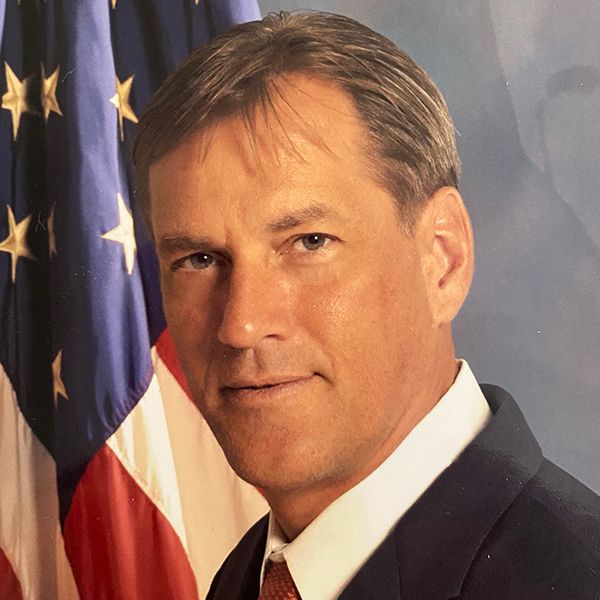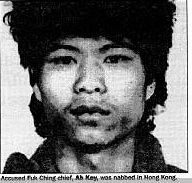
In all my years of journalism, William "Bill" McMurry is the single most impressive law enforcement official I've ever met. He has what feels like the perfect combination of trustworthiness and resolve, open-mindedness and the ability to take on massive challenges. Tom and I first heard
In all my years of journalism, William "Bill" McMurry is the single most impressive law enforcement official I've ever met. He has what feels like the perfect combination of trustworthiness and resolve, open-mindedness and the ability to take on massive challenges. Tom and I first heard about him in 2015 when we broke the story that the FBI had opened an investigation into the little-known 1MDB fraud.
Over the years, we ran into many sources who were cooperating with the FBI thanks to the persuasive powers of Bill's team, which included his right-hand man at the time, Rob Heuchling, and a team of dedicated prosecutors at the Department of Justice. Time and again, these people caught up in the maelstrom of a high-stakes global scandal told us they felt safest in the hands of Bill's team. This included people like the Malaysian Anti Corruption Commission, whose top leaders cooperated with the FBI under the nose of Prime Minister of Malaysia Najib Razak and his intelligence apparatus.
The co-conspirators with Jho Low would also tell us just now nervous they were about the US investigation. They couldn't think of a way, with all their billions of dollars, to subvert its course.
This story is open to all and our work is available for free to anyone who signs up with their e-mail. But investigations like this aren't cheap. If you believe accountability journalism matters, consider upgrading to a paid subscription—or sending a one-time boost. Every contribution directly funds more reporting like this.
Have a tip? Reach us at:
📩 whalehunting@projectbrazen.com
📧 projectbrazen@protonmail.com
🔒 Secure contact details here.
We protect our sources.
Bill left the FBI in in June 2020 to take on the job as CEO of a fascinating company called W1 Global, which has two quite distinct lines of operation. On one hand, they help whistleblowers bring their claims to the US government (a big business in recent years) and on the other they help people in the cross-hairs of the Justice Department and other investigative agencies become full-fledged cooperators. In the American system, cooperators who go above and beyond to help with cases are often given lighter sentences (more on that below).
Despite considering Bill a friend, I'd never heard the full story of how he became an FBI agent and how he developed his philosophy of investigation and law enforcement at length. I was completely floored by the details.
What follows is an edited version of a conversation we had last week.
Whale Hunting is FREE if you subscribe. If you want to support what we're doing please feel free to opt for the paid subscription.
What are you thinking about right now in the context of Russia's war on Ukraine?
It's certainly a tragic and scary time in history, for sure. But if you're in the global financial investigations world, it's like an explosion. In this huge, new Cold War, the global financial system is going to be a major player. The illicit movement of money around the world is going to pick up that much more. In some of these jurisdictions where it's easier to hide your wealth, business is going to double and triple.
How did your career as an investigator start?
I almost didn't go into the Air Force because I wanted to be an FBI agent since I was a little kid. My original plan to enlist in the Marine Corps right out of high school and then become a police officer like my father. But no one in my family had gone to college before me. So I was the first one to go and once I was committed to going to college and getting the degree, then the FBI was basically my end goal.
After college, I joined the Air Force Office of Special Investigations, which was like an FBI for the Air Force. It's structured exactly the same way as the FBI. The paperwork is all similar the nomenclature the culture, everything is FBI.
I investigated the whole gamut horrible rape cases where there was serial rapist inside the military that had gotten away with it for years, to drug trafficking, personal protection, and counter espionage. I was sent to Somalia in '93, and then to the Middle East for Operation Desert Shield, where was doing human intelligence collection and force protection. Those international jobs were more like going around the streets of Mogadishu with a bag of cash trying to get somebody to tell you something that would help the military put a target on a particular place.
I don't regret a minute of it. It was a life-changing experience for me. As the family of a police officer in the 70s and 80s in New Jersey, we were lower middle class. We never traveled. We didn't go anywhere. I didn't get on an airplane until I joined the Air Force. So it opened up the whole world for me.
To me a key pillar to be in good being in law enforcement, especially the FBI, is having a sense of empathy and being able to relate to people that don't look like you or are from where you're from.
After you left the Air Force and joined the FBI, what happened next in your career?
I was assigned to the New York field office to investigate drug trafficking. When you're young, it's exciting, dangerous work. The idea was to focus on the Mexican gangs and crime in the Bronx, but about a month into my job I was called in and told I was being moved to Asian organized crime because of a department shake-up.
At the time, i was disappointed but it turned out to be the best thing that ever happened to me because it was fascinating work in the 90s. The Asians controlled heroin distribution into the United States back then and they were very heavily involved in illegal alien smuggling. New York City was having boats lands on their shores full of illegal Chinese immigrants and that came with large-scale Asian organized crime.
It threw me into a whole world I didn't know anything about. I didn't speak the language. It was even worse than it sounds because back then we didn't have anyone who spoke Fujinese in the FBI. The original immigrants in Chinatown were all Cantonese and from Hong Kong and Canton, but by the 90s there was a huge influx of people from Fujian Province in China. The FBI didn't have a single person that spoke that dialect. Trying to interview people and recruit people through a Mandarin translator that could only get bits and pieces of information across to them was probably as difficult a cultural barrier that you could ever have in investigations, but again, I think it just comes down to that kind of human connection and even even with all those huge barriers, people can tell if you really care about what you're doing and and, I just really immersed myself in that in that culture.
There were a lot of people being victimized back then. Illegal aliens were trying to come here to make a better life and they were getting sold into prostitution or they were being essentially forced into slavery because they owed their smugglers an incredible amount of money. As we ingratiated ourselves more and more to people that were in those situations, we were able to work our way into the criminal organizations that were running all that and we ended up being extremely successful. One of the big bigger cases focused on a woman who was one of the main traffickers over time a woman known as Sister Ping.

Who was one of the most fascinating people you worked with during that time? How did you develop that relationship?
The worst person in that entire case was a guy called Ah Kay. He was one of the main gang leaders in Chinatown at the time, but we ended up arresting him in Hong Kong and extradited him to the US. He became one of the most prolific cooperators home the FBI ever had, certainly in the Asian organized crime arena.
He helped us solve dozens and dozens of murders and armed robberies and was the key witness to bring down Sister Ping. He personally was involved in seven murders. I developed such a strong relationship with him that we were in almost daily contact with each other for 15 years. I knew his kids and wife. I knew everything about him. You end up forming a symbiotic relationship when a cooperator fully commits to cooperation. They can make your career for you because you just go off and solve a million cases with them and in return, you give them another chance at life. I mean, he was he was going to die in prison, for sure. And he ended up serving a total of 12 years and he's been out for years and years now.
He was just an extraordinarily intelligent, savvy guy with tons of charisma. He would have succeeded on Wall Street or anywhere he wanted. Life circumstances created a situation where being a gangster was was his best option and he was really good at that. And then he was really good at being a cooperator once he decided that's what he was going to be.
I have seen enough in my career where I believe people's environments and their circumstances can push them in a direction that gets worse and worse. They make a decision that leads them to the next thing until they're cold blooded murderers. They find a way to rationalize that to themselves. For the most part, the people they're killing are in "the life" – they are part of rival gangs.
You've won awards and praise over the years. Was anything more meaningful than that?
One of the things that will always stick with me in my career is my experience with a Vietnamese killer for a gang in Chinatown. He had a horrific life and when you looked at his crimes – he killed innocent people – you might have thought he was completely irredeemable. But he became a very important cooperator for me. Later, he was sentenced to life in prison but I formed a relationship with his wife, too, and stayed in touch.
The guy and his wife had told their kids who were little at the time that he had to go back to Vietnam for work and then you know, he basically disappeared from their lives. And when the kids became young adults, the wife called me back and asked if I would help explain that to them that their father, although he did horrific things, had some redeeming qualities, as well. I always took that as something to be proud of.

Can people truly be redeemed from a life of murder and crime?
I'm a huge believer in the US Justice System for a lot of reasons, but one of the main reasons is that a major pillar of that system is incentivizing cooperation. Places like the UK do not do that. You would think that the US and UK judicial systems would be very similar but that but they are not. One of the big differences is they don't really rely heavily on cooperating witnesses. They always push back on the idea of cooperators, saying why would you believe these people and how the jury or the judge will never believe them.
But that's a very hollow argument because the United States has 100 years or more of experience of this working out well. We present the cooperating witness to the jury and to the judge in a way that highlights immediately all the bad stuff that the person ever did. They never get to the witness stand until they completely been broken down by the system. We explain that if you're going to go down this path it has to be 100% and there are huge penalties for violating that. Then you build your investigation around corroborating evidence that props that witness up.
Not only does that process result in better prosecutions, but more expansive investigations. All of those things are good things but what it also does is it gives the individual defendant a chance at redemption. Just the process of going through that is sort of cleansing, especially for a career criminal that's known nothing but that their entire adult life. They have an ingrained loyalty to their organization or gang and a belief they don't want to be a rat or flip. Once you break them of that mindset, and they spill decade's worth of criminal conduct, it's almost like a burden comes off.
Is there a trick to flipping somebody?
I don't even think it's a trick. I've been to a bunch of interrogation schools and all that stuff is valuable. But the the most successful FBI agents or police officers I've ever didn't really look at it as a trick. They looked at it as every human being has their needs. You have to understand the needs and wants of the person that's sitting across the table from you and you have to be genuine if you're going to use that.
You cannot shake them with a trick or some magic thing. You have to tap into the core thing that drives them. For Ah Kay, it was the fact that a rival murdered three of his brothers. When it came time to convince him to cooperate, it wasn't about "let me show you this evidence and play you these wiretap tapes." It was about what are you going to do about the fact that these people killed your whole family?
Did you ever feel too sympathetic to one of your cooperators?
I never lost a minute of sleep for putting people in jail for the rest of their lives. To me, it's a balance between empathy and and humility, but also having a just an absolutely unshakable faith in the law. I can empathize with you. I'll even sit with you while you cry and feel bad for you as you say goodbye to your family for the last time but the law is the law.
In the corruption arena, I was always drawn to this idea that these people operate in a stratosphere where the law doesn't touch them sometimes. That's one of the reasons why I've always felt it's important to go after the people even with all the cards are stacked against you. They have every tool imaginable to try to beat you back. And and just this idea that there's still people in 2022 on this earth that are essentially above the law. I guess, you know, the right word is: It just pisses me off. That shouldn't exist.
What advice would you give to a young investigator getting started in the world?
It is incredibly humbling to be given the authority that you're given as an FBI agent. There's no greater authority that man can give another man than to say you can take the life and liberty of people under the right circumstances. To me that's an awesome sense of responsibility and if you if you go about your career with that attitude, you'll be a much better agent or or police officer. Shame on me if I either abuse it or or if I don't use it to its full potential.
I always took a lot of pride in the fact that time and gain throughout my career, you would hear from heads of cartels or oligarchs or kleptocrats that the only people they're afraid of is the United States and the FBI and the Department of Justice. They feel like they can deal with anything else but if the US comes after you, you've got a real problem. I just love the idea that I represented an organization that could touch those highest-level type people.
If the one thing that's keeping you up a little bit at night is the fact that people like us are out there trying to get you, that gives me a bit of satisfaction.
There's so much darkness in the world – corruption, violence, theft. How do you stay hopeful?
It is exhausting. Sometimes you do kind of shake your head and say "man, what the heck is this all for?" But I think of law enforcement as being a gardener. The best analogy is the world is this giant rose garden and we need people to prune back the weeds and do the gardening. If you don't, then the garden will get choked out and the darkness will overtake the light. It would be foolish for a gardener to retire and think this is all for nothing. The weeds just keep coming back. You pass the responsibility to the next generation, you know? You do what you can for 20 to 30 years, and then you pass it on to the next generation and hope you make progress.
The world is this giant rose garden and we need people to prune back the weeds and do the gardening. If you don't, then the garden will get choked out and the darkness will overtake the light.
Get in touch with us: bradley@projectbrazen.com and tom@projectbrazen.com
You can also follow Whale Hunting on Twitter.
If you like what we're doing, please consider changing your subscription to a paid one. Your donations help us spend more time on the newsletter.
 Related Posts
Related Posts